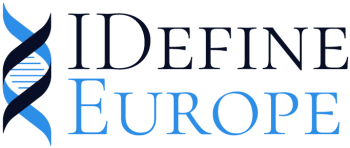
VIDEOS
Conference videos are available at VideoLectures.NET and at IDefine Europe’s YouTube channel.
Date & venue
Hybrid event (in person and online streaming).
Where: Ljubljana, Slovenia, Hotel Slon
When: 1st – 2nd June 2023 (CEST)
Scope
The Kleefstra Syndrome Scientific Conference 2023: “Moving towards the uptake and use of Artificial Intelligence (AI) in research and clinical work” focuses on Kleefstra syndrome, a rare genetic disorder with app. 1000 diagnosed patients worldwide. Due to the rarity of the disease, a global perspective is needed to foster new research insights. The event brings together Kleefstra syndrome PAOs, clinicians and researchers from different domains having a common interest: share new research findings related to Kleefstra syndrome that will lead the Kleefstra community to optimize current care and to reach their final goal, the discovering of a life-changing treatment and cure for Kleefstra syndrome. A special focus is given to artificial intelligence (AI), which is generally still something new for the rare disease communities, but it can play a crucial role, especially in shortening the time needed for new research insights.
Organizing committee

TANJA ZDOLŠEK DRAKSLER, PhD
Jožef Stefan Institute, SI, NGO IDefine Europe, SI and ERN ITHACA ePAG

Professor TJITSKE KLEEFSTRA, PhD, MD
Erasmus UMC and Radboud UMC, Center of Excellence for Neuropsychiatry at Vincent van Gogh, NL and ERN ITHACA board member
Programme
Printable version of the programme is available here.
DAY 1: Thursday, June 1st, 2023 (CEST)
9:30 – 10:00 Registration and gathering with networking
10:00 – 10:05 Welcome
Tanja Zdolšek Draksler, PhD, Jožef Stefan Institute and IDefine Europe, Slovenia
prof. Tjitske Kleefstra, MD, PhD, Erasmus Rotterdam UMC, The Netherlands
10:05 – 10:15 An introduction to the Kleefstra syndrome community
Tanja Zdolšek Draksler, PhD, Jožef Stefan Institute and IDefine Europe, Slovenia
10:15 – 10:40 The Kleefstra syndrome journey
prof. Tjitske Kleefstra, MD, PhD, Erasmus Rotterdam UMC, The Netherlands
10:40 – 11:00 Kleefstra syndrome data collection and the Rare Diseases Observatory
Tanja Zdolšek Draksler, PhD, Jožef Stefan Institute and IDefine Europe, Slovenia
11:00-11:25 Addressing global challenges related to SDGs with AI
Mitja Jermol, Jožef Stefan Institute, IRCAI, UNESCO Chair on Open Technologies for OER and Open Learning, Slovenia
11:25-11:30 Discussion
11:30-11:45 Networking and coffee break
11:45 – 12:05 IPSC-derived neural cells and strategies for upregulating the wt allele in patient cells
prof. Hans van Bokhoven, PhD, Radboud University, The Netherlands
12:05 – 12:25 Inverse Molecular Docking as a New Powerful Tool for Drug-Repurposing
prof. Urban Bren, PhD, FKKT, University of Maribor, Slovenia
12:25 – 12:45 Growth and metabolism in Kleefstra syndrome
Arianne Bouman, MD, Radboud UMC, The Netherlands
12:45 – 13:05 EEG data analysis and AI/ML methods for brain conditions
Katerina Tzimourta, PhD, University of Western Macedonia, Greece
13.05 – 13:25 Characterizing sleep in Kleefstra syndrome individuals and fly models
Lara van Renssen, Radboud UMC, The Netherlands
13:25 – 13:30 Discussion
13:30-14:30 Lunch break (buffet) with networking discussions
14:30 – 14:40 Patient/caregiver reported data: Genida registry
Pauline Burger, PhD, IGBMC, France
14:40 – 15:00 Data visualisations for clinical and patients use
Alenka Guček, PhD, Jožef Stefan Institute, Slovenia and University of Uppsala, Sweden
15:00 – 15:20 How to tackle unstructured data with data science? Showcase of Genida example (HumaneAI micro project)
Erik Novak, Jožef Stefan Institute, Slovenia
15:20 – 15:40 Patients-centered care plan based on Big Data and AI technologies
Izidor Mlakar, PhD, FERI, University of Maribor, Slovenia
15:40 – 16:00 Cell consequences of loss of function of the epigenetic factor EHMT1
prof. Sabrina Rivero, PhD, University of Sevilla, Spain
16:00 – 16:20 Chromatinopaties study
Laura Pezzoli, MD, ASST Papa Giovanni XXIII, Bergamo and Federica Gaudioso, MD, Policlinico di Milano, Italy
16:20 – 16:30 Wrap up of the day
16:30 – 17:00 Networking discussions with coffee
DAY 2: Friday, June 2nd, 2023 (CEST)
9.30 – 10:00 Gathering with coffee
10:00 – 10:20 Dissecting the cell-type specific contribution of EHMT1 to neuronal network function using IPSC-derived brain models
prof. Nael Nadif Kasri, PhD, Radboud University, The Netherlands
10:20 – 10:40 Comprehensive EHMT1 variant interpretation provides insight into EHMT1 functions
Dmitrijs Rots, PhD, Erasmus Rotterdam UMC, The Netherlands and Children’s Clinical University Hospital, Latvia
10:40 – 11:00 The establishment and characterization of iPSC derived 3D neurosphere cultures from a Kleefstra patient
Andrea Balogh, PhD, BioTalentum, Hungary
11:00 – 11:20 Advanced treatments and its transfer to patients
prof. Roman Jerala, PhD and Mojca Benčina, PhD, National Institute of Chemistry, Slovenia
11:20 – 11:40 AI/ML in healthcare
assist. prof. Aleksander Sadikov, PhD, Faculty of Computer and Information Science, University of Ljubljana, Slovenia
11:40 – 11:50 Discussion
11:50 – 12:10 Networking and coffee break
12:10 – 12:30 Kleefstra syndrome speech and language study
Lottie Morrison, Murdoch Children’s Research Institute, Australia
12:30 – 12:50 Kleefstra and Kleefstra-like syndromes in the Spanish Undiagnosed Rare Diseases Program
Maria José Barrero, PhD, National Institute of Health Carlos III, Spain
12:50 – 13:10 Innovative approach towards the national organization of rare disease management – Slovenian National plan
assist. prof. Luca Lovrečić, MD, PhD, Ljubljana UMC, Slovenia
13:10 – 13:30 GestaltMatcher: rare disease matching using facial phenotypic descriptors
prof. Peter Krawitz, PhD, Universitätsklinikum Bonn, Germany
13:30-13:40 Discussion
13:40-14:40 Lunch break (buffet) with networking discussions
Joao Pita Costa, PhD, Jožef Stefan Institute, Slovenia
15:00 – 15:20 The QuaLiSID system and related video analysis technologies for supporting individuals with intellectual disabilities
Vasileios Mezaris, PhD, CERTH, Greece
15:20 – 15:40 Kleefstra syndrome, a hidden metabolic disorder?
prof. Annette Schenck, PhD, Radboud UMC, The Netherlands (online lecture)
15:40 – 16:00 Arrhythmias including Atrial Fibrillation in Kleefstra Syndrome: a possible epigenetic link
Sunil K. Vasireddi, MD, Stanford University, Palo Alto, California, United States (online lecture)
16:00 – 16:30 Wrap up of the day followed with networking coffee
Contact
tanja.zdolsek@ijs.si
Organizers

Acknowledgement of funding

This Networking event has received funding from the European Union’s Horizon 2020 research and innovation programme under the EJP RD COFUND-EJP N° 825575.